- Home
- McBain, Ed
So Long As You Both Shall Live (87th Precinct) Page 2
So Long As You Both Shall Live (87th Precinct) Read online
Page 2
Right on cue, old Kling walked up to the bar in his tuxedo, grinning from ear to ear, a shock of blond hair hanging on his forehead, the victim they’d all been looking for, the cop who’d called in the 10–13. Someone had the wit to say, “And here he is now!” and then all the cops laughed and began slapping him on the back. One of the cops, a man named Andy Parker who looked somewhat disheveled and unshaven, despite the fact that he was all dressed up for a wedding, warned Kling that in some parts of the country—like for example this city—it was a custom for friends of the groom to kidnap the bride on her wedding night, especially if she was someone as beautiful as Augusta. Kling laughed and reminded them all that kidnapping was a Class A felony punishable by life imprisonment, and they all laughed again, and finally Carella shushed them all with the palm of his outstretched hand. Looking around to make sure they all had glasses in their hands (as if they needed anything more to drink), he lifted his own glass and said, “Fellas, I want to tell you how happy this day makes me. I want to say I’ve been hoping for this day for a long, long time now. Do you remember when this kid first came on the squad, that was after he cracked the Jeannie Paige murder when he was still a patrolman, I think you all remember that.”
There were nods and murmurs of assent, and Hal Willis chose this moment to slap Kling on the back again, and Meyer Meyer winked at him, and then Carella said, “Well, this kid here has added a lot to that squadroom, we’ve had a lot of good times together over the years. All I want to do now is wish him the best of good times in the future, the best of everything.” He lifted his glass a trifle higher. “To Augusta and you,” he said, “a good marriage, and happiness for years and years to come. Congratulations, Bert.”
That’s his goddamn name, Pike thought.
“If that guy takes one more picture…” Kling said.
“He’s doing a conscientious job,” Augusta said.
They had changed into street clothes and were at the front desk of the hotel now, registering for the room they had reserved. Across the lobby, Pike was standing with his camera to his eye, focusing for a long shot of the couple at the desk.
“Does he plan to sleep with us tonight?” Kling asked.
“Who plans on sleeping?” Augusta asked, and smiled slyly.
“I mean—”
“I’ll gently suggest that maybe he’s taken enough pictures, okay?” Augusta said. “He’s a dear friend, Bert. I don’t want to hurt his feelings.”
“Okay.”
“And it will be nice to have a record afterwards.”
“Yes, I know. Gus, are you happy?”
“Yes, darling, I’m very happy.”
“It was a real nice wedding, wasn’t it?”
“Yes.”
“I mean, the ceremony itself.”
“Yes, darling, I know.”
“There’s something awesome about those words,” Kling said. “When you come to think of it, that’s one hell of a frightening contract.”
“Are you frightened?”
“Sure, aren’t you? I take this very seriously, Gus.”
“So do I.”
“I mean, I really do want it to last so long as we both shall live.”
“I do, too.”
“So…so let’s just make sure it does last, Gus.”
“Are you worried about it?”
“No, but—well, yes, in a way. I love you so much, Gus, I just want to do everything I can to make you happy and to see you grow and to—”
“Your key, sir,” the night clerk said.
“Thank you,” Kling said.
“That’s room 824, the bellhop will show you up.”
“Thank you,” Kling said again.
Across the lobby, Pike was sitting on one of the sofas, putting a fresh roll of film into his camera. The moment he saw them moving away from the desk, he snapped the back of the camera shut, and rose, and began walking swiftly toward them.
“I just want one more picture,” he said in immediate apology.
“You’ve really been an angel,” Augusta said. “Did you get a chance to enjoy the wedding, or were you just working all day long?”
“I had a marvelous time,” he said. “But I still need another picture.”
“Which one is that?” Kling asked apprehensively.
“I haven’t got a single shot of Augusta and me. Bert, I would appreciate it greatly if you took a picture of Augusta and me.”
Kling smiled broadly. “I’d be happy to,” he said.
“I just put in a fresh roll,” Pike said, and handed Kling the camera and the strobe pack, and then looked around the lobby and maneuvered Augusta to a potted palm just inside the revolving entrance doors, where a steady trickle of people moved in and out of the hotel. Kling brought the camera to his eye, focusing from a distance of some three feet, and then held up the strobe as though he were the Statue of Liberty. “Smile,” he said, and pressed the shutter-release button. The shutter clicked, the strobe light flashed. Pike and Augusta blinked.
“That’s got it,” Kling said.
“Thank you,” Pike said.
As Kling handed the camera and strobe back to him, he noticed there were tears in Pike’s eyes.
“Alex,” he said, “we can’t thank you enough for what you did today.”
“It was my pleasure,” Pike said. He kissed Augusta on the cheek, said, “Be happy, darlin’,” and then turned to Kling and took his hand and said, “Take good care of her, Bert.”
“I will,” Kling promised.
“Good night then, and the best to both of you,” Pike said, and turned swiftly away.
In the elevator, the bellhop said, “Are you newlyweds or something?”
“That’s right,” Kling said.
“You’re the third newlyweds I had today. Is this some kind of special day or something?”
“What do you mean?” Augusta asked.
“Everybody getting married today. Is it a religious holiday or something? What’s today, anyway? The ninth, ain’t it?”
“Yes.”
“So what’s the ninth? Is it something?”
“It’s our wedding day,” Augusta said.
“Well, I know that, but is it something?”
“That is something,” Augusta said.
“Right, I appreciate that,” the bellhop said, “but you know what I mean, don’t you? I’m trying to figure out, is it a day of some special significance where I’ve already had three couples who got married today, that’s what I’m trying to figure out.” They were on the eighth floor now, and walking down the corridor to room 824. When they reached the room, the bellhop put down their bags, and then unlocked the door and stepped aside for them to enter.
In the room, they both fell suddenly silent.
The bellhop wondered aloud why all the double-bedded rooms were always at the end of the hall, but neither of them said a word in answer, and the bellhop speculated that maybe all the hotels were trying to discourage romance, and still they said nothing in response. He put their bags up on the luggage racks, and showed them the bathroom, and the thermostat, and explained how the red light on the phone would indicate there was a message for them, and made himself generally busy and visible while waiting for his tip. And then he did something rare for a bellhop in that city—he touched his fingers to his cap in a sort of salute and silently left the room. Kling put the DO NOT DISTURB sign on the knob and locked the door, and silently he and Augusta hung up their coats, and then began unpacking their bags.
They were neither of them kids. Their silence had nothing to do with virginal apprehension or fears of physical incompatibility or frigidity or impotence or anything even mildly related to sex, which they had been enjoying together and almost incessantly for quite some time now. Instead, their silence was caused by what they both recognized to be a rather serious commitment. They had talked about this peripherally in the lobby, but now they thought about it gravely and solemnly, and decided separately that they’d been speakin
g the truth when they said they wanted this to last forever. They both knew that no one had forced them into marriage: they could have gone on living together forever. They had each and separately agonized over taking the plunge, in fact, and had each and separately arrived at the same conclusion almost at the same time. When Kling had finally asked her to marry him, Augusta had said yes at once. He’d asked her because he’d decided simply and irrevocably that he wanted to spend the rest of his life with her. And she’d accepted because she’d made the same decision concerning him. They were now married, the man had spoken the words this afternoon at a little past 4:00, the man had said, “For as you both have consented in wedlock, and have acknowledged it before this company, I do by virtue of the authority invested in me by the church and the laws of this state now pronounce you husband and wife. And may God bless your union.” The word “union” had thrilled them both. Union. That was what they wanted their marriage to be, a true union, and that was what each was separately thinking now.
There wasn’t much to unpack. They would be here at the hotel only for the night, and would be flying to Guadeloupe in the morning. When Kling finished he asked if he should call down for a nightcap, and Augusta said no, she’d had enough to drink tonight. He asked if she wanted to use the bathroom first, and she said, “No, go ahead, Bert, I want to lay out some clothes for the morning.” She looked at both her bags then, trying to remember in which one she’d packed what she would be wearing on the plane tomorrow, a perplexed look on her face, her lower lip caught between her teeth as she pondered this very serious and weighty problem.
“I love you,” Kling said suddenly.
She turned to look at him, a slight smile of surprise on her face. “I love you, too,” she said.
“I mean, I really love you.”
“Yes,” she said quietly, and went into his arms and held him close. They stood that way for several moments, locked in silent embrace, not kissing, just standing very close to each other, hugging each other fiercely. Then Augusta looked up into his face, and touched his lips gently with her fingers, and he nodded, and they broke apart. “Now go take your shower,” Augusta said, and Kling smiled and went into the bathroom, and closed the door behind him. When he came out ten minutes later, Augusta was gone.
He had planned something of a big male macho entrance, and he stood now in the bathroom doorway with a towel wrapped around his waist, and saw immediately that she was not in the room, and then saw that the door to the corridor was open. He assumed Augusta had gone out into the corridor for something, perhaps in search of a chambermaid, though he couldn’t understand why she hadn’t simply picked up the phone if she needed anything. He went to the door and looked out into the corridor, and saw no trace of her. Puzzled, he closed the door to the room and then went to the closet where he’d hung his robe. He didn’t expect to find Augusta hiding in there or anything stupid like that; Augusta just wasn’t the type to play such childish games. He went to the closet only because he felt suddenly naked with just the towel around his waist, and he wanted to put on his robe. He had begun thinking, in fact, that perhaps the boys of the 87th were up to some mischief. As Parker had explained, a traditional wedding-night prank was to spirit a bride away from her groom and return her later when a ransom was paid, the ransom usually consisting of a nightcap shared with the newlyweds amidst much guffawing and slapping on the back. Kling had never heard of a bride being kidnapped from her honeymoon suite, but the boys of the 87th were professionals, after all, and could be expected to come up with something more inventive than simply snatching a girl from a wedding reception. As Kling grabbed the knob on the closet door, it all began to seem not only possible but likely. They had undoubtedly found out which room Kling and Augusta were in, and then either loided the door lock with the plastic do not disturb sign, or actually used a pick and tension bar on it, cops being just as good as burglars when it came to such matters. Wearily he opened the closet door. He liked the guys on the squad a lot, but he and Augusta had to get up early in the morning to catch their plane, and he considered the prank not only foolish but inconsiderate as well. As he reached for his robe he realized that he’d now have to sit around here twiddling his thumbs till those crazy bastards decided to call with their ransom demand. And then, when they finally did bring Augusta back, there’d be another half-hour of drinking and laughing before he finally got rid of them. He noticed then that Augusta’s overcoat was still on the clothes bar, just where she’d hung it when they first entered the room.
He was still not alarmed—but a quiet, reasoning, deductive part of his mind told him that this was November and the temperature outside was somewhere in the low thirties, and whereas the boys of the 87th might be spirited, they certainly weren’t stupid or cruel; they would never have taken Augusta out of the hotel without a coat. Well, now, wait a minute, he thought. Who says they had to take her out of the hotel? They may be sitting in the lobby, or better yet, the bar right this very minute, having a few drinks with her, laughing it up while they watch the clock till it’s time to call me. Very funny, he thought. You’ve got some sense of humor, fellows. He went to the phone, picked up the receiver, and then sat on the edge of the bed while he dialed the front desk. He told the clerk who answered that this was Mr. Kling in 824, he’d just checked in with his wife, a tall girl with auburn hair…
“Yes, sir, I remember,” the clerk said.
“You don’t see her anywhere in the lobby, do you?” Kling asked.
“Sir?”
“My wife. Mrs. Kling. She isn’t down there in the lobby, is she?”
“I don’t see her anywhere in the lobby, sir.”
“We were expecting some friends, you see, and I thought she might have gone down to meet them.”
“No, sir, she’s not in the lobby.”
“Would you have seen her if she’d come down to the lobby?”
“Well, yes, sir, I suppose so. The elevators are just opposite the desk, I suppose I would have seen her if she’d taken the elevator down.”
“What about the fire stairs? Suppose she’d taken those down?”
“The fire stairs are at the rear of the building, sir. No, I wouldn’t have seen her if she’d taken those down. Unless she crossed the lobby to leave the building.”
“Any other way to leave the building?” Kling asked.
“Well, yes, there’s the service entrance.”
“Fire stairs come anywhere near that?”
“Yes, sir, they feed into both the lobby and the service courtyard.”
“What floor’s the bar on?”
“The lobby floor, sir.”
“Can you see the bar from the front desk?”
“No, sir. It’s at the other end of the lobby. Opposite the fire stairs.”
“Thank you,” Kling said, and hung up, and immediately dialed the bar. He described Augusta to the bartender and said she might be sitting there with some fellows who looked like detectives. He was a detective himself, he explained, and these friends of his, these colleagues, might be playing a joke on him, this being his wedding night and all. So would the bartender please take a look around and see if they were down there with his wife? “And, listen, if they are there, don’t say a word to them, okay? I’ll just come down and surprise them, okay?”
“I don’t have to take a look around, sir,” the bartender said. “There’re only two people in here, and they’re both old men, and they don’t look nothing like what you described your wife to me.”
“Okay,” Kling said.
“They kidnapped my wife on our wedding night, too,” the bartender said dryly. “I wish now they woulda kept her.”
“Well, thanks a lot,” Kling said, and hung up.
It was then that he saw Augusta’s shoe. Just the one shoe. Lying alongside the wastebasket on the floor there. Near the dresser. Just to the left of the door, near one of the dressers. The pair she’d put on when she changed out of her bridal costume. But no longer a pair. Just one o
f them. One high-heeled pump lying on its side near the wastebasket. He went to it and picked it up. As he looked at the shoe (telling himself there was still no reason to become alarmed, this was just a prank, this had to be just a prank) he was suddenly aware of a cloying scent that seemed to be coming from the wastebasket at his feet. He put the shoe on the dresser top, and then knelt and looked into the wastebasket. The aroma was sickeningly sweet. He immediately turned his head away, but not before he’d seen a large wad of absorbent cotton on the bottom of the otherwise empty basket. He realized at once that the smell was emanating from the cotton, and suddenly recognized it for what it was: chloroform.
It was then that he became alarmed.
Steve Carella arrived at the hotel at precisely ten minutes past midnight to find Kling in a state that could generously be described only as hysteria. He was smoking when he let Carella into the room, something Carella had never seen him do in all the years they’d been working together. He closed the door behind Carella and immediately began pacing the room. He was wearing tan gabardine slacks, blue sports shirt open at the throat, a tan cardigan sweater over it, tan socks, brown loafers. He looked like a gentleman horse breeder, dressed casually for a day at the races, lacking only a pair of binoculars slung around his neck. But his nervous pacing seemed more suited to the maternity ward of a hospital. Carella immediately told him to sit down and calm down. Kling did neither.
“Have you called anyone but me?” Carella asked.
“No. I figured if there’s going to be a ransom demand—”

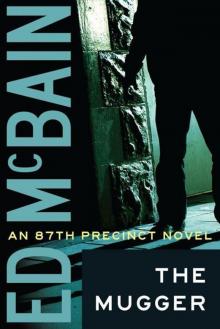 87th Precinct 02 - The Mugger
87th Precinct 02 - The Mugger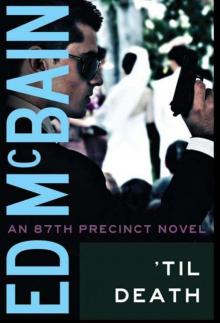 87th Precinct 09 - Til Death
87th Precinct 09 - Til Death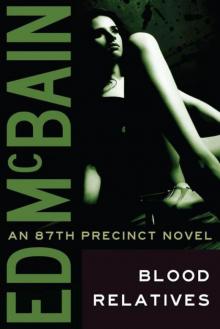 Blood Relatives (87th Precinct)
Blood Relatives (87th Precinct) Killer's Payoff
Killer's Payoff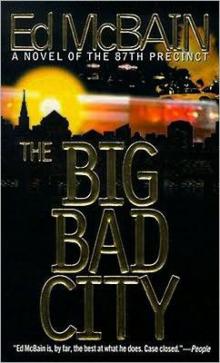 The Big Bad City
The Big Bad City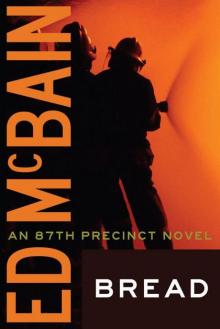 Bread (87th Precinct)
Bread (87th Precinct) Transgressions Vol. 3
Transgressions Vol. 3 Runaway
Runaway So Long As You Both Shall Live (87th Precinct)
So Long As You Both Shall Live (87th Precinct) Killer's Wedge
Killer's Wedge